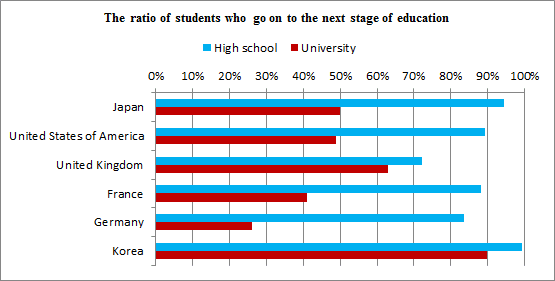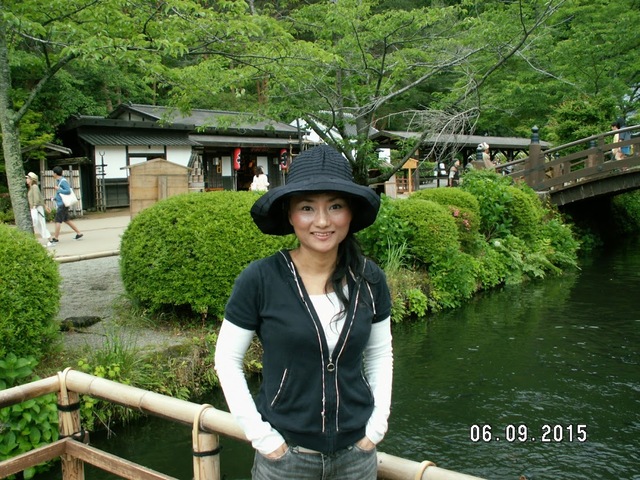日本での英語学習度合いは学歴、経歴に直接関わっている。
In Japan, learning capacity of English is directly related with educational background and personal career.
日本で大学を卒業した者なら中学3年、高校3年、短大2年か大学4年かで最低でも8年に及ぶ英語教育を受ける。
Those who have graduated collage in Japan, they must have taken English classes at least for 8 years for 3 years at junior high school, at high school 3 years, at 2 years of junior collage or 4 years of university.
韓国も同じような教育システムであるが、小学生から基礎英語を学ぶ時間は日本より多いと聞いた。
South Korea also has similar educational system, but I have heard the time for learning basic English from primary school students have more classes than Japanese students have taken.
ジャグリシューはJapanese+Englishを合成したことばで日本内だけで通じる和製英語のことを指す。
The word of Jaglish is synthesized Japanese plus English and it refers to Japanese-English that have been using only in Japan.
コングリッシューも同じくKorean+Englishで韓国人が英語だと思われる発音や言い方をすることを言う。
Konglish is the same of Korean plus English and it also refers to how Korean speak English or how they pronounce as English that they are supposed to communicate with English.
私は韓国と日本で教育を受けたからジャグリシューやコングリッシューにもっぱら詳しい。
Since I had taken educations in both South Korea and Japan, so I am pretty sure of those details.
ドラマとか映画を観てどこの国の英語なのかを当てることは簡単でもある。
It is very easy for me to guess what country’s English it is when watching dramas or movies.
日本や韓国では英語が流暢だと技能者のように見え、または技術者のように扱われる。
In Japan or South Korea, if someone speaks English fluently he or she looked like a technician and treated like a mechanic.
英語ができるだけで偏差値の高い大学に入れ、上場企業に就職することもできる。
With only English capacity can enter a university which has a higher deviation and can get a job at a listed high company.
だが、問題は英語を6年間習っても話せないということだ。
However, the problem is CAN’T speak English even those for 6 years of learning.
日本での中学や高校での英語は学習科目の一環で英語知識は日常生活とはかけ離れた試験科目に過ぎない。
English at a junior high or high school in Japan, it is just one of subjects that must pass for tests and English knowledge is far from everyday life.
多くの生徒が数学を習っても日常と関連が無いとみなすことと変わりがない。
It is no difference from most of students considering that learning mathematics is not related with everyday life.
日本や韓国の学生にとって英語を習う目的はテスト点数を取るためだけである。
The purpose of learning English for students both South Korea and Japan is only to get scores for tests.
日本の生徒が6年間英語を習っても英語で話せないのは教える先生すら英語で自分の意見を言えないからだ。
The reason why Japanese students can’t speak English even their 6 years of learning is because even teachers who teach students can’t say their opinions in English.
日本の先生はまず文法を教え、文法用語を教える。
Japanese English teachers teach grammar at first and the grammar terms.
30年前の文法参考書に書いてある言い方の例を教える。
They teach some samples of way to say that written in a reference book republished 30 years ago.
英語圏ではもはや使われていない表現が参考書に堂々に乗っていて、教科書にも使われている。
On the reference books the expression examples those are not used anymore in English-speaking countries still used proudly and they are referring on text books too.
塾をやっていた時、生徒が持っている学校でもらった英語ワークプリントは読むだけでも頭痛がして吐き気さえさせた。
When I had running my cram school, I felt headaches and even made me sick bad for just gave a look for student’s workprints that they received from their school.
生徒は先生が教える知識が正しいか正しくないかも分からず、テスト得点のためにひたすら丸暗記をしなければならない。
Students don’t know whether right or wrong for knowledge that taught from teachers and they force themselves memorize at all to get scores for tests.
日本の英語教育の問題点は今から改善しようとしてもその結果が出るまで最低15年はかかる。
The problem of English education in Japan, it will take at least 15 years to improve to get the result if they try to make better from now.
英語で話せない先生が英語を教える、この問題を解決するためには
To solve the problem of teaching English the teacher who is a none-verbal communicator,
①英語の先生に英会話の訓練をする
Give English train course to the teachers.
②英語の先生に言語技能資格試験をする
Give a language qualification test for English teacher.
③文法至上主義から会話術訓練に変える
Change to a training course for conversation from grammar supremacy.
大まかには上記の3つを今からでも実行すると彼らから教育を受けた者の未来が変わる。
If above briefing of three lists can be set, the learners who take education from the teachers, their future will change.
生徒の未来が変われば日本や韓国の未来も変わる。
If student’s future changed, the future of Japan and Korea also will change.



















